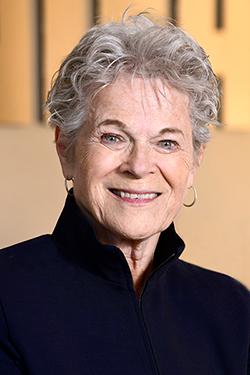
Janet Hall, M.D., M.S.
Senior Investigator
Clinical Research Branch/Reproductive Physiology & Pathophysiology Group
NIEHS
Research Topics
Janet Hall, M.D., M.S., serves as Chief of the Clinical Research Branch. She heads the Reproductive Physiology and Pathophysiology Group and holds a secondary appointment in NIEHS Reproductive and Developmental Biology Laboratory.
The Reproductive Physiology and Pathophysiology Group studies the mechanisms involved in the integrated control of the reproductive system in women and its disruption in reproductive disorders. The research focus, within the broad area of women’s health, is on the neuroendocrine interactions that govern normal reproduction. The group has used this information as a backdrop to provide insights into the pathophysiology of clinical reproductive endocrine disorders, translating this information to provide physiologically-based treatments.
Investigation of the neuroendocrine control of the reproductive system in women requires the use of a combination of complementary models. To this end, group members have studied normal women and those with congenital or acquired deficiencies or abnormalities in the secretion or the responsiveness to gonadotropin releasing hormone (GnRH). Patients may present with absent or delayed puberty, irregular menstrual cycles or loss of cycles after they have been established. In these studies, Hall and her group utilized frequent blood sampling for measurement of LH as markers of GnRH secretion and developed and utilized physiologic probes including GnRH, GnRH agonists and antagonists and estradiol, estrogen receptor blockers and aromatase inhibitors, as well as neuroimaging modalities. Recent studies have also focused on the neuroendocrine interaction between energy deprivation, stress and the reproductive system. Other studies have involved the role of endocrine disrupting chemicals on the reproductive system.
A new area of interest is precision environmental health. Studies are determining how the external and internal exposomes, alone or in combination with our genes, impact human health and determine the risk of disease.
Biography
Janet Hall is an internationally known clinician and clinical investigator. She received her Masters of Medical Sciences in exercise physiology and her M.D. and Internal Medicine training at McMaster University in Ontario, Canada. She completed her training in Endocrinology and Metabolism at Massachusetts General Hospital in Boston and rose to the rank of Professor of Medicine at Harvard Medical School. She had continuous NIH extramural grant funding until moving to the NIEHS intramural program in 2015. Hall was elected to the Association of American Physicians in recognition of her contributions to both the science and academics of medicine and, as a leader in the field, is a former President of the Endocrine Society.
Selected Publications
- Delaney A, Burkholder AB, Lavender CA, Plummer L, Mericq V, Merino PM, Quinton R, Lewis KL, Meader BN, Albano A, Shaw ND, Welt CK, Martin KA, Seminara SB, Biesecker LG, Bailey-Wilson JE, Hall JE. Increased Burden of Rare Sequence Variants in GnRH-Associated Genes in Women With Hypothalamic Amenorrhea. J Clin Endocrinol Metab. 2021;106(3):e1441-e1452.
- Akhtari FS, Lloyd D, Burkholder A, Tong X, House JS, Lee EY, Buse J, Schurman SH, Fargo DC, Schmitt CP, Hall J, Motsinger-Reif AA. Questionnaire-Based Polyexposure Assessment Outperforms Polygenic Scores for Classification of Type 2 Diabetes in a Multiancestry Cohort. Diabetes Care. 2023;46(5):929-937.
- Lee EY, Akhtari F, House JS, Simpson RJ Jr, Schmitt CP, Fargo DC, Schurman SH, Hall JE, Motsinger-Reif AA. Questionnaire-based exposome-wide association studies (ExWAS) reveal expected and novel risk factors associated with cardiovascular outcomes in the Personalized Environment and Genes Study. Environ Res. 2022;212(Pt D):113463.
- Schupmann W, Miner SA, Sullivan HK, Glover JR, Hall JE, Schurman SH, Berkman BE. Exploring the motivations of research participants who chose not to learn medically actionable secondary genetic findings about themselves. Genet Med. 2021;23(12):2281-2288.
- Bry-Gauillard H, Larrat-Ledoux F, Levaillant JM, Massin N, Maione L, Beau I, Binart N, Chanson P, Brailly-Tabard S, Hall JE, Young J. Anti-Müllerian Hormone and Ovarian Morphology in Women With Isolated Hypogonadotropic Hypogonadism/Kallmann Syndrome: Effects of Recombinant Human FSH. J Clin Endocrinol Metab. 2017;102(4):1102-1111.
Related Scientific Focus Areas
This page was last updated on Monday, August 21, 2023


